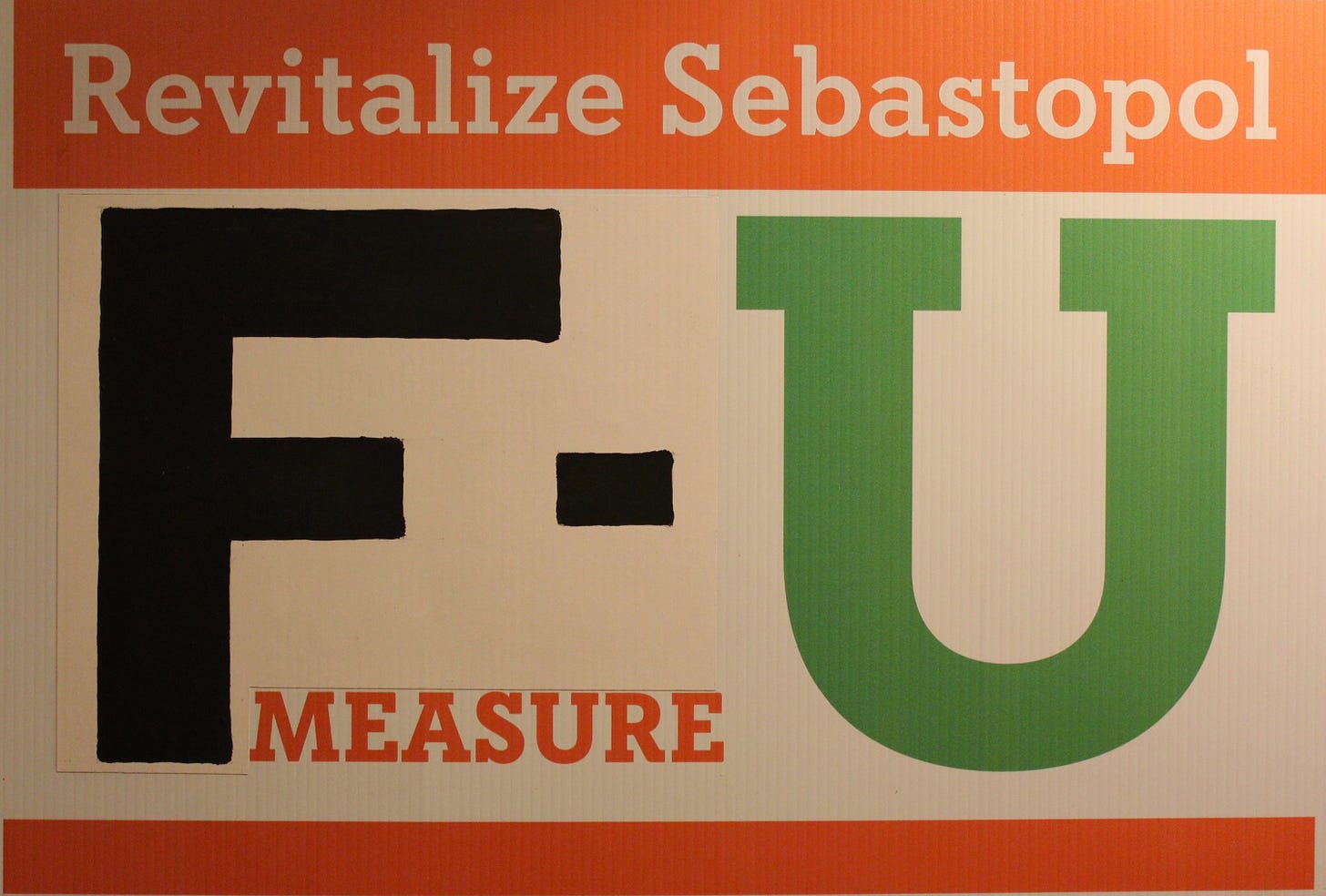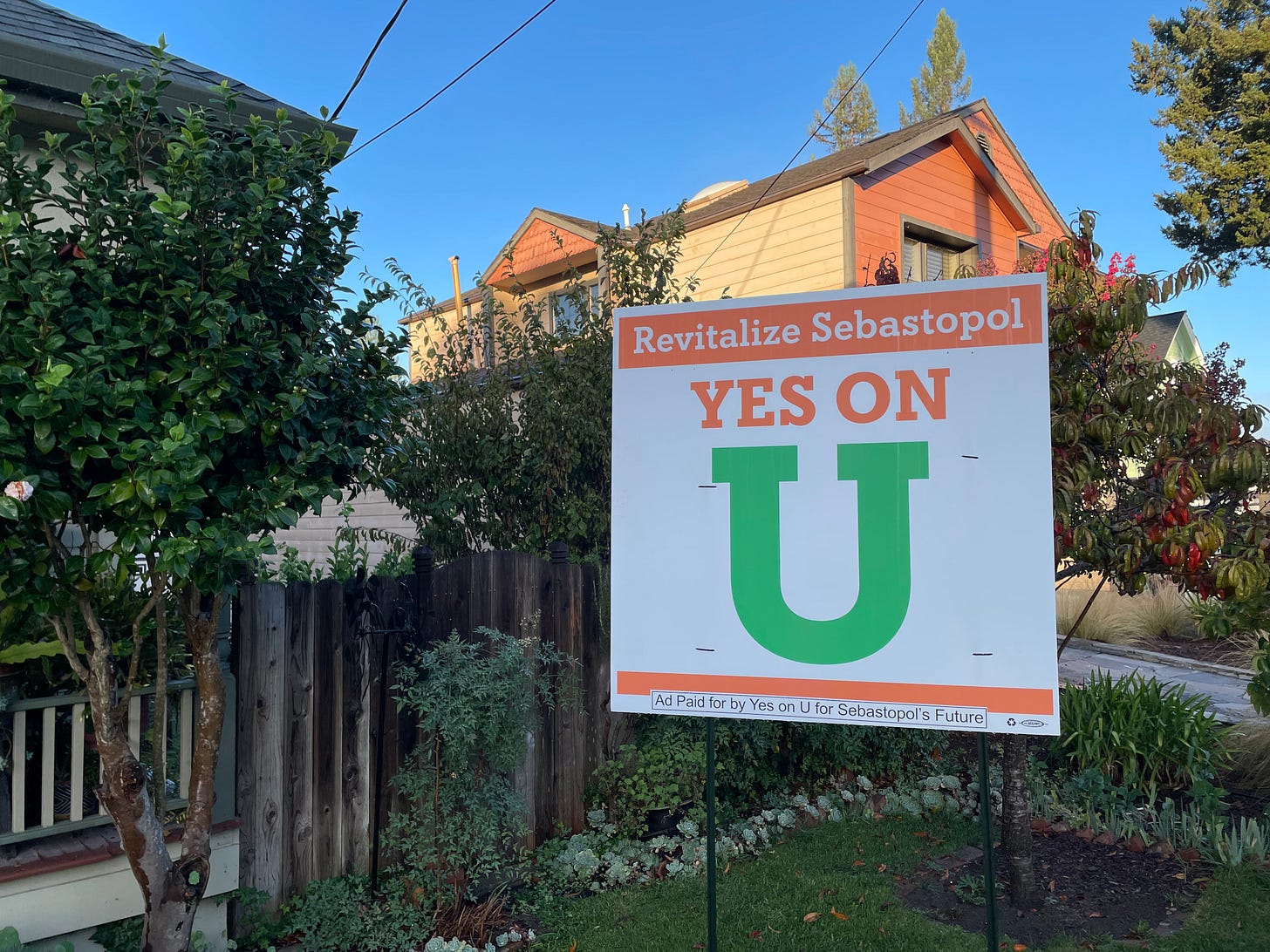What happens if Measure U doesn't pass?
If it passes by a majority vote, the half-cent sales tax increase will rescue the city's finances. Otherwise...
Sebastopol’s finances are in need of a lifeboat.
Just this year, the city’s total budget sits at a deficit of nearly $700,000, and, without other sources of revenue such as new business or an increase in taxes, that number could rise to $2 million or more annually in the coming years, according to city documents.
With the exclusion of “one-time” revenues and expenditures, such as money the city was given during COVID and the money which has been spent on urgent repairs, Sebastopol’s budget has also been at a deficit for each of the last four years.
Thus, four of the five current city council members are pleading with the Sebastopol populace to vote yes on Measure U, a half-cent sales tax on the Nov. 5 ballot, lest the city cut expenses or pull further from their reserves. (One council member, Jill McLewis, remains iffy on Measure U, but thinks the citizens deserve to vote on it.) Measure U would bring in approximately $1.5 million a year until it sunsets after 12 years, which would be enough to balance the budget for the time being.
“The City had reserves in 2020,” wrote Mayor Diana Rich, who is at the end of her final term in the council, in an email sent out to the community last week. “The Hotel Sebastopol was on schedule to break ground that Spring. We all knew a new hotel could bring in close to $1,000,000 annually to Sebastopol. We really were sitting pretty. The future looked golden. Then we turned the calendar page to March of 2020….We all thought the economy would eventually recover. It hasn’t.”
Indeed. With neither Hotel Sebastopol nor The Barlow Hotel set to open any time soon, the city is faced with stagnant revenue as expenditures rise. Thankfully, according to City Manager Don Schwartz, the city had substantial reserves before COVID hit, and thus has been able to weather the storm of the last few years without sinking.
To describe the situation the city is currently in—and the situation the city will be faced with if Measure U doesn’t pass—Schwartz deploys the use of analogies. Here’s one:
“Let’s say you received a $5,000 inheritance and used the money to pay the monthly dues for a health club membership,” Schwartz told me. “The inheritance, a one-time source of income, is going to run out. But the health club membership is a recurring expense. At some point something’s going to give—you have to drop the health club, cut another expense, or find another source of income. One-time revenue is by its nature not reliable in the long term, our reserves are lower, and at some point, something’s going to give. That’s started to happen with deferred maintenance in our buildings, the poor condition of our streets reduced support for the Senior Center and Community Center programs, etc. Without significant, ongoing revenue those problems will be much more challenging.”
The city has several separate reserves—created by the previous council before things went south. The reserves in question include the Buildings, Facilities & Infrastructure reserve, which, according to the city budget, is projected to be at $1,040,235 by the end of fiscal year (FY) 2024-25; the Equipment, Technology & Vehicle reserve, which is projected to be at $791,636 at the end of FY 2024-25; and the Pension and OPEB reserve, which is projected to be at $3,328,269 at the end of FY 2024-25. By June 2025, the unassigned General Fund balance (e.g., the General Fund reserve) is expected to be approximately $2,869,130.
Schwarz says these reserves “are not the solution to our financial challenges,” but rather show that the city has set aside funds for growing expenses such as buildings, vehicles, technology, and the other purposes.
“Having reserves for these needs is a prudent financial practice,” Schwartz said.
In the case that Measure U doesn’t pass, Schwartz will be ambivalent in draining those reserves. Instead, he may suggest significant reductions in expenditures which will be presented for consideration by the city council.
In all, Schwartz, who took over the post of city manager at the start of this year, is steadfast in his belief that Sebastopol will not have to resort to drastic measures such as un-incorporating or filing for bankruptcy if Measure U doesn’t pass. By consolidating city departments such as Engineering and Public Works along with the consolidation of city services into regional systems as is anticipated with the Sebastopol Fire Department and the Gold Ridge Fire District, Sebastopol can keep up with other cities in the county that are not struggling as much financially, in part because they are larger.
“You need to create more economies of scale,” Schwartz said. “That's one of the challenges of smaller cities—to do everything on your own.”
According to a staff report from a Sept. 17 city council meeting, these reductions in expenditures may include the following:
“Leaving a Maintenance Worker position vacant, affecting the maintenance of public spaces and facilities.
Further reductions in the maintenance of streets, parks, and Ives Pool.
Leaving police officer positions vacant, which would affect public safety.
Keeping a dispatcher position open, increasing stress and fatigue for remaining staff.
Not adding funding for natural disaster response improvements.”
Standing in the way
Opposition to Measure U comes from either those who are naturally opposed to an increase in taxes or those who feel that the current city council and management doesn’t deserve a lifeboat—or wouldn’t know how to use it if they got one—given the way these opponents say they’ve mismanaged the budget in recent years.
Those shortcomings, according to those against Measure U, include what they say was the misappropriation of water and sewer rates along with unnecessary spending that has gone towards legal fees and affordable housing projects.
“Until there is some candid public discussion about the causes of the current financial crisis, along with a plan to avoid same in future, asking us to pony up more money for ‘general government use’ is a pretty big ask,” wrote Susan E. on one of our previous posts regarding Measure U.
It is worth noting—as was discussed in our article on Measure I—that if both Measure I (“Our Kids, Our Future”) and the half-cent Sebastopol tax pass, there is a possibility that Sebastopol’s Measure U tax could be cut in half as a result of a state law capping the total sales tax, with a likely legal challenge ensuing. But we will cross that bridge when we get there.

.



If you want to see more grassroots protest sign, check out this local board which has a lot of great comments.
https://sebcofo.org/viewtopic.php?t=102
Sign up to get a variety of local opinions and perspectives, especially public comment from Council meetings.
Most likely Hotel Sebastopol will not open as the developers do not see the area as financially viable due to the fact the Council has not kept up public spaces and Sebastopol has the highest number of homeless people per capita in Sonoma County. They said as much when they attended a recent Council meeting. For instance, Windsor has 26 unhoused while Sebastopol has 87. This makes Sebastopol unattractive for people to finance and build a $60,000,000 hotel.
It remains unclear if it is to citizens benefit to remain incorporated. The majority of tax revenue goes toward sustaining City administration yet the County dumps all of its homeless housing in Sebastopol without reimbursing citizens for lost revenues and increased service costs. For instance, Hopkins pushed both Homekey Projects and the SAVS RV Village on Sebastopol while she has zero homeless services in Forestville and will have a lower sales tax rate in Forestville. Sebastopol has many organizations which service West County such as the senior Center, Ives Pool, the Community Cultural Center and there is no reason why the City should not get reimbursed by the County for these organizations. If the City were unincorporated, the County might reimburse as they are used by West County residents. If the City can't afford the fully fund the police department, then maybe it is better to work with the County. The fire department is already in consolidation talks. As past Council's have not advocated for citizens and business owners, which is the duty of the Council, why pay all this money to sustain a City administration? Has Sebastopol improved over the last 10 years or declined? Are the parks nicer? Are the roads better? Are businesses thriving? Was the fire department fully funded? Was the police department fully funded?
One main problem is that Council is a full time job and only pays $300 per month. This means that only a few people can actually afford to be on Council. These people might be motivated by personal, political interests rather than the general well-being of the community. It is fairly clear that is what has happened and why Sebastopol is in such terrible shape. At least the Supervisor makes over $200K per year and has a staff.
https://sonomacounty.ca.gov/Main%20County%20Site/Health%20and%20Human%20Services/Health%20Services/Documents/Homelessness%20Services/Homeless%20Data/County%20of%20Sonoma%202023%20Point-in_Time%20Count%20Results.pdf